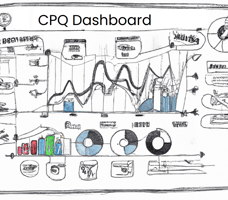"Ever wonder why your competitors seem to have a sixth sense when it comes to quoting? There's a...
Understanding CPQ KPIs: Metrics that Matter in Configurate-Price-Quote
"Most businesses wrongly believe they’ve mastered CPQ metrics if they’re seeing revenue growth. What if I told you that's a mere illusion?"
Often, surface-level indicators like increasing revenue can mask underlying inefficiencies. Navigating the depths of CPQ isn't just about numbers; it's about truly understanding the metrics that drive those numbers. Let’s debunk some myths and spotlight the KPIs you might be overlooking.
1. CPQ Conversion Rate: Beyond Just Sales
While sales numbers are paramount, it’s the conversion rate that unveils the real story. A high conversion rate indicates your CPQ system's effectiveness in turning opportunities into sales. However, if this rate is stagnant or dwindling, delve into your CPQ process. Perhaps, it's not as user-friendly as you thought or there are hitches in the product configuration stage. Addressing these bottlenecks can significantly uplift your sales.
2. Average Quote Time: Speed Matters
In a world of instant gratification, how quickly you deliver a quote can be a deal-breaker. If your average quote time is lengthy, you risk losing potential clients to competitors with faster CPQ systems. Aim for speed, but not at the cost of accuracy—a balance is essential.
3. Quote-to-Cash Cycle: Efficiency in Spotlight
Revenue growth is fantastic, but how efficient is your quote-to-cash cycle? The time taken from quoting a client to receiving payment can offer insights into potential delays or inefficiencies in invoicing, approval processes, or even follow-ups.
4. CPQ Error Rate: Precision is Key
An often-overlooked metric, the CPQ error rate, gauges the accuracy of your configure-price-quote process. A high error rate can lead to customer dissatisfaction, returns, or even loss of business. Regularly auditing and refining your CPQ process can minimize these errors.
5. User Adoption and Training Time: The Human Element
No CPQ system is beneficial unless your team adopts it. Monitor how quickly your team adapts to CPQ changes and the time spent on training. These metrics can help tweak training methodologies, ensuring smoother transitions during updates.
6. Customer Feedback on Quotes: The External Viewpoint
While internal metrics are pivotal, customer feedback on quotes offers an external perspective. Are your clients finding the quotes comprehensive? Is there clarity in pricing? Addressing these queries can enhance your CPQ's effectiveness.
7. Cross-Sell and Up-Sell Rate: Expanding Opportunities
A well-optimized CPQ system can identify cross-sell or up-sell opportunities, increasing the quote's value. If these rates are low, you might be missing out on potential revenue streams.
8. CPQ System Downtime: Reliability Check
Any system downtime can lead to lost opportunities. Ensure your CPQ solution is robust and has minimal outages. Regular maintenance and updates can mitigate prolonged downtimes.
To wrap it up, while it's tempting to get swayed by booming revenue numbers, understanding the granular CPQ KPIs can offer insights that drive sustainable and efficient growth.
So, the next time you analyze your CPQ's performance, look beyond the obvious, dig deeper, and let the real metrics guide your strategy.




